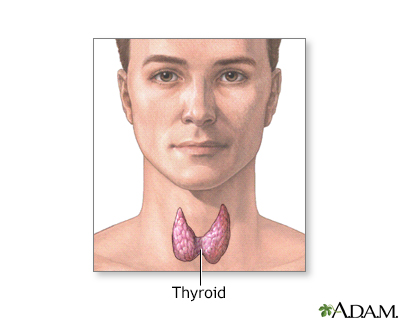Chronic thyroiditis (Hashimoto disease)
Hashimoto thyroiditis; Chronic lymphocytic thyroiditis; Autoimmune thyroiditis; Chronic autoimmune thyroiditis; Lymphadenoid goiter - Hashimoto; Hypothyroidism - Hashimoto; Type 2 polyglandular autoimmune syndrome - Hashimoto; PGA II - Hashimoto; Hashimoto's disease; Hashimoto's thyroiditis
Chronic thyroiditis is caused by a reaction of the immune system against the thyroid gland. It often results in reduced thyroid function (hypothyroidism).
The disorder is also called Hashimoto disease.
The thyroid gland is located in the neck, just above where your collarbones meet in the middle.
Images




Causes
Hashimoto disease is a common thyroid gland disorder. It can occur at any age, but is most often seen in middle-aged women. It is caused by a reaction of the immune system against the thyroid gland.
The disease begins slowly. It may take months or even years for the condition to be detected and for thyroid hormone levels to become lower than normal. Hashimoto disease is most common in people with a family history of thyroid disease.
In rare cases, the disease may be related to other hormone problems caused by the immune system. It can occur with poor adrenal function and type 1 diabetes. In these cases, the condition is called type 2 polyglandular autoimmune syndrome (PGA II).
Rarely (usually in children), Hashimoto disease occurs as part of a condition called type 1 polyglandular autoimmune syndrome (PGA I), along with:
- Poor function of the adrenal glands
- Fungal infections of the mouth and nails
- Underactive parathyroid gland
Symptoms
Symptoms of Hashimoto disease may include any of the following:
- Constipation
- Difficulty concentrating or thinking
- Dry skin
- Enlarged neck or presence of a goiter, which may be the only early symptom
- Fatigue
- Hair loss
- Heavy or irregular menstrual periods
- Intolerance to cold
- Mild weight gain
- Mood changes
- Small or shrunken thyroid gland (late in the disease)
Exams and Tests
Laboratory tests to determine thyroid function include:
Imaging studies and fine needle biopsy are generally not needed to diagnose Hashimoto thyroiditis.
This disease may also change the results of the following tests:
- Complete blood count
- Serum prolactin
- Serum sodium
- Total cholesterol
Untreated hypothyroidism can change how your body uses medicines that you may take for other conditions, such as epilepsy. You'll likely need to have regular blood tests to check the levels of the medicines in your body.
Treatment
If you have findings of an underactive thyroid, you may receive thyroid replacement medicine.
Not everyone with thyroiditis or goiter has low levels of thyroid hormone. You may just need regular follow-up by a health care provider.
Outlook (Prognosis)
The disease stays stable for years. If it does slowly progress to thyroid hormone deficiency (hypothyroidism), it can be treated with hormone replacement therapy.
Possible Complications
This condition can occur with other autoimmune disorders. In rare cases, thyroid cancer or thyroid lymphoma may develop.
Severe untreated hypothyroidism can lead to a change in consciousness, coma, and death. This usually occurs if people get an infection, are injured, or take medicines, such as opioids.
When to Contact a Medical Professional
Contact your provider if you develop symptoms of chronic thyroiditis or hypothyroidism.
Prevention
There is no known way to prevent this disorder. Being aware of risk factors may allow earlier diagnosis and treatment.
Related Information
HypothyroidismEndocrine glands
Thyroid nodule
References
Brent GA, Weetman AP. Hypothyroidism and thyroiditis. In: Melmed S, Auchus RJ, Golfine AB, Koenig RJ, Rosen CJ, eds. Williams Textbook of Endocrinology. 14th ed. Philadelphia, PA: Elsevier; 2020:chap 13.
Jonklaas J. Hypothyroidism. In: Robertson RP, ed. DeGroot's Endocrinology. 8th ed. Philadelphia, PA: Elsevier; 2023:chap 74.
Pearce EN, Hollenberg AN. Thyroid. In: Goldman L, Cooney KA, eds. Goldman-Cecil Medicine. 27th ed. Philadelphia, PA: Elsevier; 2024:chap 207.
Wassner AJ, Smith JR. Hypothyroidism. In: Kliegman RM, St. Geme JW, Blum NJ, Shah SS, Tasker RC, Wilson KM, eds. Nelson Textbook of Pediatrics. 21st ed. Philadelphia, PA: Elsevier; 2020:chap 581.
BACK TO TOPReview Date: 2/28/2024
Reviewed By: Sandeep K. Dhaliwal, MD, board-certified in Diabetes, Endocrinology, and Metabolism, Springfield, VA. Also reviewed by David C. Dugdale, MD, Medical Director, Brenda Conaway, Editorial Director, and the A.D.A.M. Editorial team.

Health Content Provider
06/01/2025
|
A.D.A.M., Inc. is accredited by URAC, for Health Content Provider (www.urac.org). URAC's accreditation program is an independent audit to verify that A.D.A.M. follows rigorous standards of quality and accountability. A.D.A.M. is among the first to achieve this important distinction for online health information and services. Learn more about A.D.A.M.'s editorial policy, editorial process and privacy policy. A.D.A.M. is also a founding member of Hi-Ethics. This site complied with the HONcode standard for trustworthy health information from 1995 to 2022, after which HON (Health On the Net, a not-for-profit organization that promoted transparent and reliable health information online) was discontinued. |
The information provided herein should not be used during any medical emergency or for the diagnosis or treatment of any medical condition. A licensed medical professional should be consulted for diagnosis and treatment of any and all medical conditions. Links to other sites are provided for information only -- they do not constitute endorsements of those other sites. © 1997- 2025 A.D.A.M., a business unit of Ebix, Inc. Any duplication or distribution of the information contained herein is strictly prohibited.
